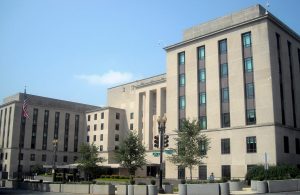A three-part series from Reveal and the Center for Public Integrity tells the history of “40 Acres and a Mule,” the United States’ most famous attempt at reparations for formerly enslaved people.
The government program called for reserving land along the coasts of South Carolina, Georgia and North Florida where newly freed people could live, work and govern themselves.
That promise was never kept, and almost all the land was given to the former enslavers.
As part of the series, called “40 Acres and a Lie,” journalists identified 1,250 formerly enslaved Black Americans who were given land, only to have it taken away. They also conducted genealogical research to locate and speak to living descendants of those Black Americans.
Alexia Fernández Campbell, senior reporter at the Center for Public Integrity, said the goal of the series was not only to detail this historical event, but also show its impact on families today.
“What did they do? Were they able to get land on their own? What happened? What happened to their descendants? And what about their descendants who are alive today?” Fernández Campbell said Friday on “The Florida Roundup.”
“… It’s a story that I think impacts people all over the country. And we’re hoping that other people may be able to find descendants that we couldn’t find and maybe we’ll be able to tell stories that have been waiting 150 years to be told.” Alexia Fernández Campbell
Alexia Fernández Campbell
A family’s history
Mila Rios’ great-great-grandfather, Pompey Jackson, was given 4 acres of land in Grove Hill near Savannah, Georgia, before it was taken. Rios, who is one of the subjects of “40 Acres and a Lie,” said she was amazed to find out her great-great-grandfather was promised that parcel of land.
“My great-grandmother was very, very good at telling our family history. However, her father was so young when he was given the land, he was only like 18 or 19 years old,” Rios said on “The Florida Roundup.” “And he was only given 4 acres because he was not married at that time. And I think it didn’t affect him as much as it would have had he have been older and had a family.
“So that is an aspect that my great-grandmother never mentioned. So I don’t know if her father, being that he was so young, even spoke to her about that.”
She said she’s grateful her great-grandmother, Florence Jackson, filled her in on all aspects of Pompey Jackson’s life.
“I mean, she would tell me of some of the things that they used to, that he taught her about the making of the wine, about the making of the lye,” said Rios, adding that Pompey Jackson was a carpenter by trade and was hired on another plantation after leaving Grove Hill.
If he had been able to keep the land, Rios said it would have been a great help to Pompey Jackson’s family.
“And I think that he may not have moved into Savannah proper. As a matter of fact, I’m sure he would not have; he would have built his home out there and my great-grandmother may have stayed there,” Rios said. “And to be very honest with you, my entire family may have stayed a little longer. But as I told Alexia, the reason why we left had nothing to do with the land being taken from us. We left because of Jim Crow.”
‘It’s all valuable land’
Fernández Campbell said a whole team was involved in finding land titles like the one given to Pompey Jackson. A colleague used image recognition artificial intelligence to scan the nearly 1.8 million records in the Freedman’s Bureaucollection to find more documents; hundreds of more names and about 100 more land titles turned up as a result.
“… It was so hard because these logs, they just say, oh, for example, Pompey got 4 acres on Grove Hill in Georgia. And then we’re like, well, where is this plantation?” Fernández Campbell said. “It was so hard to find it. Luckily, it helped because now they’re building development there. And it’s called The Habersham Plantation, but then Mila also found another part of the plantation is actually a community called Grove Hill Plantation.”
In October 2023, 4 acres of land on Grove Hill sold for $250,000. Fernández Campbell noted how, in some cases, it wasn’t always easy to determine the value of a parcel.
“We do have some really good examples of this one gated community on Skidaway Island near Savannah, and we know it’s a massive gated community that’s now mostly white,” she said. “And it sits on like four plantations where dozens of people got land titles. So that to us was a very concrete example of the value of that land today, because it’s on the coast. Most all this land is on the coasts, and it’s all valuable land.”
Reparations for descendants
The series also discusses reparations for families who had their land taken.
“If you look at the totality, 400 years of being in this country, the Middle Passage, free labor, Jim Crow, civil rights. Yes, I think there should be some type of reparations.” Greg Estevez
Greg Estevez
“We’ve heard from many Black Americans, even descendants who are like, I don’t expect reparations,” Fernández Campbell said. “And then there were Black descendants who said, yes, I do expect it. There were white descendants who said, no, we shouldn’t be paying reparations, and others who said, absolutely.”
Rios said she doesn’t think she deserves reparations, but notes some of her family members may look at things differently.
“There are so many of us now. And if you just dispersed it to the families, I don’t even know how that would be done. So me, personally, to be more succinct, no, I don’t think I deserve anything,” Rios said.
Greg Estevez, who lives in Jacksonville, is the great-great-great grandson of Jim Hutchinson, an enslaved man who was given land on Edisto Island, South Carolina. As part of the series, Estevez spoke with reporter April Simpson on reparations for descendants.
“If you look at the totality, 400 years of being in this country, the Middle Passage, free labor, Jim Crow, civil rights. Yes, I think there should be some type of reparations,” Estevez said. “What that is, I can’t tell you and I’m not smart enough to know how to fix it. I don’t know how to fix it. You know, even today, a lot of people don’t even want to acknowledge it, and if they do acknowledge it, they downplay it.”
The series “40 Acres and a Lie” is available to read on Mother Jones. Readers can search through the list of 1,250 people who received land titles, as identified by the Center for Public Integrity. Fernández Campbell said she hopes people who may not have known or realized they have a connection to “40 Acres and a Mule” can look through the list and learn more about their ancestors.
“And I think it’s important to note that even though these stories seem very essential to North Florida, Georgia and South Carolina, people migrated all over the country,” Fernández Campbell said. “We know during Jim Crow to, through the Great Migration, we found descendants who are living in Michigan and Ohio, California, New York, all over the country. So it’s a story that I think impacts people all over the country. And we’re hoping that other people may be able to find descendants that we couldn’t find, and maybe we’ll be able to tell stories that have been waiting 150 years to be told.”
You can listen to “40 Acres and a Lie” on your public radio station starting June 15.
Copyright 2024 WUSF Public Media – WUSF 89.7




